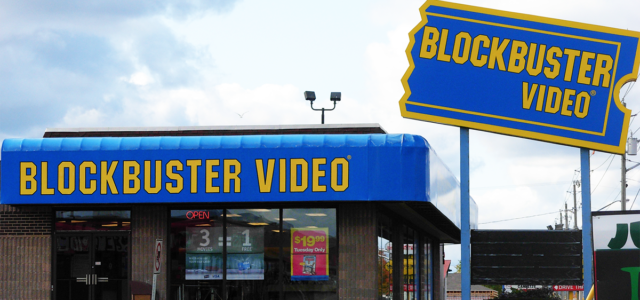The property company Hammerson, one of the UK’s most prominent owners of shopping centres, have been going through a bit of a rough patch lately. Their CEO, David Atkins, announced his resignation, they revealed that they only managed to collect 37% of rent due in the second quarter this year, announced an 11.2 per cent fall in revenue in 2019 and their £400 million deal to off-load seven of their shopping centres to private equity group Orion bit the dust. However, they are not alone. Businesses across all sectors are falling victim to an emerging “domino disruption” that we must all be alert to.
What we are seeing here is an example of the real impact of disruption from adjacent sectors. A reminder that this isn’t something that stops with immediate neighbours. Domino disruption is recognition of far-reaching consequences of disruption in any sector and a warning that we all need to think more broadly about who our competitors are.
How disrupters catch you out
The reason so many business leaders are able to delude themselves there’s no threat to them from disrupters is because they are looking in the wrong places. Businesses and their leaders are incredibly blinkered when it comes to spotting threats.
They tend to focus on their existing sector and its traditional players, not realising that the majority of disrupters emerge from adjacent sectors. That’s what’s happening in the property sector. The challenge developers and property companies, management firms and maintenance companies are facing is a consequence of the actions of retailers and other businesses, who are moving away from bricks-and-mortar business models, but it’s still not that simple. It’s a cascade of consequences and we all need to understand how it works.
Your traditional competitors are rarely your primary threat
Let’s stick with the property sector as an example. Today, their competition comes as much from tech businesses with on-line platforms that enable businesses to operate on-line as it does other businesses that look like they do themselves. It’s not just e-commerce platforms either. A property company’s competitors include video conferencing, community and project management platforms.
While this domino disruption has been entirely predictable, because they haven’t been accustomed to taking the broad view, developers have remained in the “it’s-how-we’ve-always-done-it” rut and continue to build shops and offices that our new society won’t have a use for.
We were only just getting used to the idea that our High Streets are shrinking when the few retailers that seemed likely to still be interested in real estate decided they aren’t prepared to continue to pay the rents landlords have been accustomed to levying. As if that wasn’t bad enough for landlords, things just shifted up a gear … or two! Yes, our slide towards home shopping has just had its pole greased by a virus!
Landlords have no place to go in negotiations with retailers
As a consequence of this, more retailers than ever are demanding their rents are reduced and landlords really have no choice but to accommodate them. If they refuse the retailer will go bust and others won’t be queuing up to take on their space. There’s also pressure on landlords to accept a new rent model geared to third tenants’ turnover.
To make matters worse the property sector’s “Plan B” now appears to have been thwarted too. Now we are all becoming used to working from home, what rational business is going to turn down the opportunity to reduce their overhead by ditching their office?
There’s no longer any need to keep your people together in a concrete box. They can work from home, enjoy a better quality of life and, as long as you manage them correctly, new research tells us they’ll be more productive. Give them broadband, computers and platforms. You can train them, meet with them (virtually or periodically even physically) and they can work in teams with fewer distractions and no commute, which also help protect the environment. It’s a win-win … unless you are a developer or property business.
What’s left when “Plan B” fails?
You may believe that after decades of exploiting our hunger for shopping, developers are finally getting pay-back, but it’s hard not to reflect that fate may have dealt developers and commercial landlords a particularly bad hand.
So, What’s left for them now?
It’s a tough one.
There’s no doubt the businesses that are successful from now on will be those that can constantly innovate. I’ve said many times that business transformation marks a shift from a state of order to one of constant change. There’s no escaping this and shopping centres are already being moth-balled, there has been some innovation and reutilisation projects that may, at least, take the edge off the Damocles sword hanging over the sector. However, it’s looking increasingly like this isn’t going to work.
So far, many of these plans have leant heavily on the need for office accommodation or hotels. The fact that travel is set to become eye-wateringly expensive isn’t the only reason this avenue is looking less realistic. Corona-fuelled stimulation of green issues and social conscience is forcing travel and hospitality operators to re-think their business models too. Our new home-working habit is looking like the least of property companies’ worries.
While these influences may have been prompted by the Coronavirus they are nonetheless representative of the “state of constant change” I referred to a moment ago. Every business has to be able to deal with this. This is the era of Ronald Heifetz’s “adaptive managers”. We all have to be agile.
An example of innovation in the travel sector is a travel agency I saw this week advertising “virtual vacations”. Basically you sign up and go anywhere you like, to experience the culture and scenery of your chosen destination through a pair of goggles. And if the thought that everyone will have VR at home soon seems far-fetched to you, cast your mind back to when computers were considered “office equipment”.
Business travel is also going to reduce now that we are all on-line savvy, not to mention reluctant to sit in a sealed tube with hundreds of strangers from who-knows-where, who may well be carrying the virus. Therefore mid-week hotel bookings are going to be far rarer than hoteliers are used to.
How do you re-purpose a shopping centre?
But, what can you do with a disused shopping centre besides turning it into a hotel or office? One idea, that, if it comes off might do something to rejuvenate inner cities and ease the housing shortage, is to adapt them to housing. There’s also talk around creating in-door sports facilities, although, health and safety regulations, safeguarding, snowflake-ism (nice word. I think I’ll keep it!) and the rest of the misguided nonsense that’s become central to our modern lives, have seen to it that the facilities we do have are so expensive nobody can afford to use them. That’s another on-going, shoot-yourself-in-the-foot mistake governments, particularly in the UK, have made that has already rendered fitness, pretty much, a pursuit of the rich!
So, life has become tough for the property sector as well as organisations in sectors like maintenance, cleaning, furnishing, management and rental agents. This is where the process of domino disruption begins, but its implications travel much further than most people imagine. For example, if the daily commute isn’t a factor in our lives any longer we won’t all need to live within reach of cities. Public transport needs will change dramatically and the relativity of city and remote domestic property prices will shift.
The more you think about this the clearer it becomes that domino disruption knows no boundaries. The property sector is only a snap-shot of a phenomenon that relates to all sectors.
What are you doing to counteract “domino disruption”?
Which leads me to the question “What are you doing to re-align your business to the new and very different opportunities of the post-COVID marketplace?” I know from experience that many business leaders have been reluctant to commit to transformation and even prior to the Corona crisis were the stragglers in the race for success in the digital economy. The impact of the pandemic means they have now been written off in favour of more switched-on competitors. However, even those that were brave enough to start their transformation journey have felt the impact of the COVID crisis and in most cases, this has meant a second re-working of strategy. So if you haven’t reviewed your business in the past few weeks you should take note.
A couple of weeks ago I created a video that I hope has helped a few business leaders, who were stuck on the starting blocks with their post-COVID transformation, get moving before it’s too late. It wasn’t a complete fix, but, hopefully, it was sufficient to kick-start a few of the right kind of thoughts and actions.
How relevant is your proposition these days?
My message, in its simplest terms, was to take a fresh look at consumers and customers. Digital businesses win, fundamentally because they have the ability to deliver a better experience for their customers, so it makes sense, even if you think you know how your customers are feeling, to take another look. Things have changed a lot in the last few weeks and many business propositions have been rendered obsolete as a result.
However, understanding what people want and coming up with a plan to deliver it is the relatively easy part. What’s difficult is executing. Increasingly so, as the pace is already pretty already hair-raising and it’s getting faster every day. Because of this, businesses that can’t keep up will fold quicker than ever.
The essential role of brands
The key to achieving the level of efficiency you’ll need is a strong brand. If you aren’t clear why that is, you’ll find the answer in some of my other articles. It’s essential to the future of your business that you understand this and I’m always happy to explain it to senior executives who want to get to grips with the role of brand in business generally and transformation success in particular, so get in touch.
Meanwhile, if you are still thinking about launching your own transformation you are very close to running out of time. To have a hope of success you have to approach this in an organised way. Remember upwards of 70% of transformations fail and because the process is so disruptive, time-consuming and expensive, when they fail, it usually spells the end of the business concerned. Very often, transformations that fail do so because they start in the wrong place. Your starting point has to be to define your brand and leverage the focus only this can provide to drive the success of your business in the digital economy.
I urge every business leader out there to treat domino disruption with the seriousness and urgency it deserves. We are going to lose enough businesses needlessly as a result of their inability to respond to our rapidly-changing circumstances. Don’t make your organisation an additional casualty.
Article by channel:
Everything you need to know about Digital Transformation
The best articles, news and events direct to your inbox
Read more articles tagged: Digital Disruption, Featured









